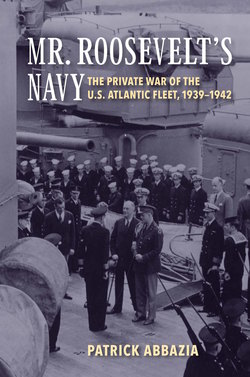Читать книгу Mr. Roosevelt's Navy - Patrick Abazzia - Страница 9
На сайте Литреса книга снята с продажи.
ОглавлениеPreface
CURIOSITY IS THE BEST PROD OF RESEARCH, and this book has its origins in curiosity. As student and historian, I have long had an interest in strategic studies and the study of battle; and when reading the history of World War II, I sometimes came upon brief, cryptic, tantalizing references to American combat operations at sea months before the Japanese attack at Pearl Harbor. For the U.S. Navy was at war in the Atlantic long before 7 December 1941: the first American warship to sustain damage and loss of life in battle in World War II was the destroyer USS Kearny, torpedoed in the North Atlantic more than seven weeks before Pearl Harbor; the first American warship sunk in combat in World War II was the destroyer USS Reuben James, torpedoed in the North Atlantic more than five weeks before Pearl Harbor. Surely such combat reflected wider operations, and suggested an undeclared naval war in the Atlantic. What were those operations? What exactly was the U.S. Navy’s role in the Battle of the Atlantic prior to American entry into the war? To what extent was the Navy escorting Allied convoys? Were there many contacts and battles with German U-boats? Were there many casualties? Were there morale problems, as there often are in limited, undeclared wars? What were the problems, hardships, and lessons of early naval operations in the Atlantic? Numerous tactical questions suggested themselves. And the tactical questions suggested strategic questions. To what extent was the classic American strategy of sea power still valid in the age of the airplane and submarine? What was the U.S. Navy’s state of readiness to conduct modern operations of sea warfare at the outset of World War II? How did Franklin Roosevelt manage and control “his” Navy’s limited, undeclared war? The numbers of my questions increased, but I found scant answers in published sources; most historians of naval operations were primarily concerned with post-1941 events and the great battles of the Pacific War.
Then necessity prodded curiosity. Wanting a topic for scholarly research, I was determined to work in some area of the operational history of World War II; much of that area having been amply written about (although not always adequately researched), I sought a virgin corner of the field. The merger of curiosity and necessity produced a decision to write a study of the U.S. Atlantic Fleet and its role in the undeclared war and after.
The result of my research is this book. It is the story of a fleet, the U.S. Atlantic Fleet, its education at war, and its impact upon strategy.
And perhaps the best reason why the story of the Atlantic Fleet needs to be told can be summed up in a personal anecdote. Recently, I was sitting in my college office, passing time in a pleasant discussion of historical topics with several colleagues. The subject turned to the high quality of American military and naval leadership at the time of World War II, and I contributed a few sea stories about the redoubtable Admiral Ernest J. King; then while making a point about pre-war planning, I happened to mention the sinking of the Reuben James with heavy loss of life on Halloween morning, 1941. Surprised, one of my colleagues, a capable professor who has taught American history at the college level for seven years, interrupted, saying, “Wait a minute. That was before Pearl Harbor! What was the Navy doing at war in the Atlantic at that time?”
I told him to read this book.
